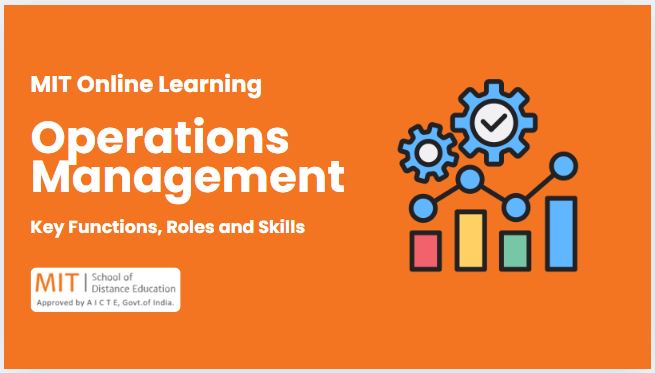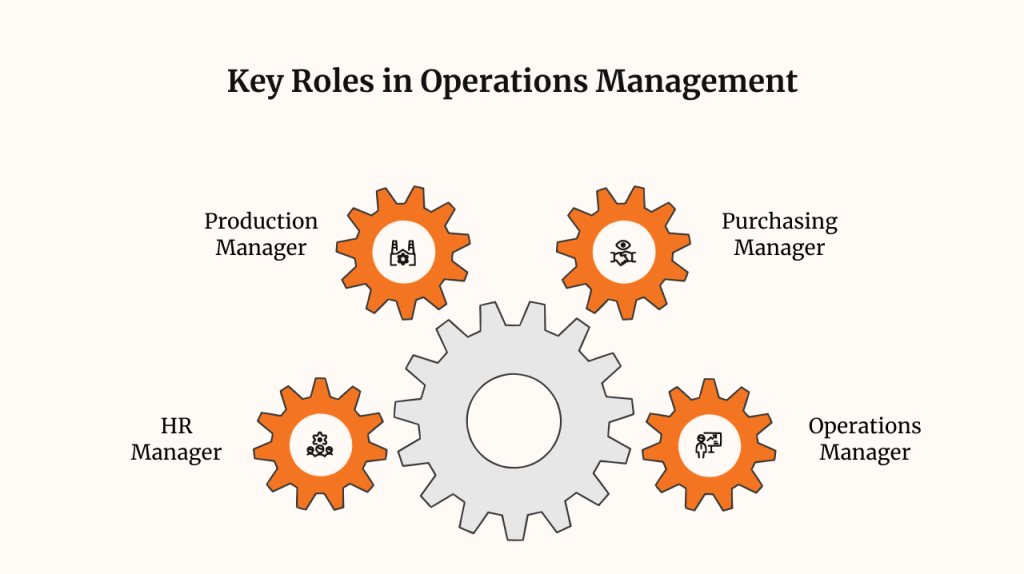
What is Operations Management?
Operations management is the strategic administration of business practices to create the highest level of efficiency in an organization. It involves planning, organizing, and supervising the production of goods and services. At its core, operations management focuses on converting materials and labor into products and services in the most efficient way possible to maximize profits and ensure customer satisfaction.
Key Aspects of Operations Management:
- Planning: Developing strategies for production, capacity, and resource allocation.
- Organizing: Structuring workflows and delegating roles for streamlined execution.
- Controlling: Monitoring output, identifying gaps, and implementing corrective actions.
- Resource Management: Efficiently utilizing labor, equipment, and materials.
- Supply Chain Management: Overseeing the flow of goods and data from suppliers to consumers.
- Quality Control: Ensuring that output meets defined standards.
- Inventory Management: Balancing supply and demand to maintain cost-effective stock levels.
- Finance & Accounting: Tracking expenses, managing financial reports, and setting budgetary policies.
- Production Management: Coordinating every phase of product creation to deliver high-quality goods.
Why is Operations Management Important?
The success of any business relies heavily on efficient operations. Operations management:
- Boosts efficiency by reducing waste and optimizing processes.
- Increases profitability through better cost management.
- Improves customer satisfaction by ensuring timely delivery and quality service.
- Enhances adaptability by responding effectively to market changes.
Simply put, operations management keeps the business engine running—smoothly and profitably.
Key Roles in Operations Management
The field of operations management offers diverse and dynamic career paths, including:

Operations Manager
This high-level role involves overseeing all production-related activities, formulating strategies, sourcing resources, and ensuring compliance with company policies.
Purchasing Manager
Responsible for procuring high-quality materials at optimal costs, negotiating supplier contracts, and maintaining quality control standards.
Production Manager
Manages the actual production process, worker schedules, budgeting, and cost estimation to ensure timely and efficient output.
HR Manager
Coordinates administrative functions, hiring, and staff development—key to sustaining high-performing operational teams.
MITSDE’s Industry-Ready Operations Management Courses
MITSDE offers several specialized programs designed to equip professionals with theoretical knowledge and practical skills across different industries. These operations management courses online are structured by academic and industry experts to meet the needs of today’s fast-evolving business landscape.
PGDM in Operations Management
This program helps professionals handle challenges related to time, budget, and cross-department coordination. It prepares learners to take on core business areas with efficiency and innovation.
Key Highlights:
- Designed in line with global industry standards.
- Focuses on service excellence, cost optimization, and time management.
- Ideal for those looking to take on leadership roles in operations.
Executive PGDM in Technology and Operations Management
This advanced-level course integrates general management concepts with technology-focused modules. It prepares working professionals to drive value through operational excellence.
Key Benefits:
- Strategic and tactical training in product and service design.
- Deep dive into supply chain and resource management.
- Ideal for mid-to-senior-level professionals aiming to upscale.
PGDBA in Operations Management
Offered as a specialization under the Business Administration umbrella, this course aims at building competencies in production, forecasting, and risk management.
Course Features:
- Comprehensive coverage of supply chain, productivity, and efficiency models.
- Focuses on both quantitative and qualitative aspects of operations management.
- Includes strategic decision-making frameworks and performance analysis.
Professional Certification in Operations Management
Perfect for those looking for short-term, impactful learning. This operations management certification focuses on best practices and practical tools to help you excel.
You’ll Learn To:
- Enhance efficiency across sectors.
- Apply Lean Six Sigma and other continuous improvement tools.
- Manage resources, reduce waste, and drive results.
Final Thoughts
As businesses grow increasingly complex, the need for skilled operations managers is more crucial than ever. From resource planning to vendor negotiation and quality control, operations management sits at the core of any successful business strategy.
Whether you’re starting your journey or upskilling mid-career, the right operations management course can open doors to new opportunities. MITSDE offers flexible, comprehensive, and industry-aligned programs—including online operations courses and professional certifications—to help you step confidently into this vital domain.

